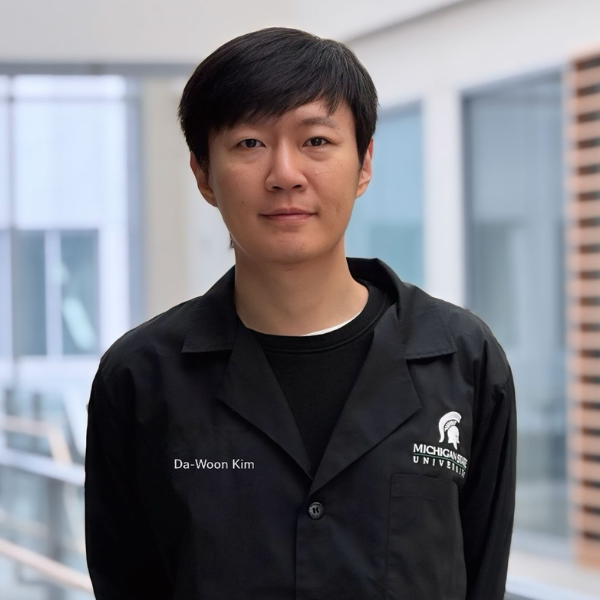Da-Woon Kim, PhD

- Postdoctoral Researcher
- Sammi Lab
- Department of Translational Neuroscience
- College of Human Medicine, Michigan State University
Biography
Dr. Da-Woon Kim received his B.S., M.S., and Ph.D. in Biomedical Sciences from Soonchunhyang University, South Korea. His doctoral research under Prof. Sung-Hwan Yun focused on the molecular and genetic regulation of sexual reproduction and secondary metabolism in F. graminearum, including the characterization of RNA interference pathways and polyketide synthase genes.
After earning his Ph.D., Dr. Kim worked as a Research Scientist at Kyung Nong Co., Ltd., where he enhanced the insecticidal properties of Beauveria bassiana and contributed to the development of a commercial biocontrol product targeting thrips.
In March 2022, he joined Michigan State University as a Postdoctoral Researcher in the Trail Lab, studying comparative transcriptomics of fungal spore germination in opportunistic human pathogenic fungi (Aspergillus and Fusarium). In March 2025, he joined Dr. Shreesh Sammi’s laboratory in the Department of Translational Neuroscience, where he investigates the neurotoxic effects of environmental contaminants.
Outside the lab, Dr. Kim enjoys watching sports—especially soccer and baseball—and spending time on board games and puzzles with friends and colleagues.
Education
|
Institution |
Field of Study |
Degree Earned |
Year |
|---|---|---|---|
|
Michigan State University, USA |
Environmental Neurotoxicology, Parkinson’s & Autism Research |
Postdoctoral Research |
2025–Present |
|
Michigan State University, USA |
Fungal Molecular Genetics, Transcriptomics |
Postdoctoral Research |
2022–2025 |
|
Soonchunhyang University, South Korea |
Biomedical Science |
PhD |
2020 |
|
Soonchunhyang University, South Korea |
Biomedical Science |
M.S. |
2016 |
|
Soonchunhyang University, South Korea |
Biomedical Science |
B.S. |
2014 |
Research Interests
Dr. Kim’s current research aims to elucidate how per- and polyfluoroalkyl substances (PFAS, e.g., PFOS), polychlorinated biphenyls (PCBs), and heavy metals influence neuronal signaling and neurodevelopmental processes using C. elegans and rodent models. He is particularly interested in the molecular and genetic mechanisms underlying Parkinson’s disease and autism spectrum disorder, combining molecular genetics, toxicology, and systems-level transcriptomics to uncover key pathways of neurotoxicity.
In addition, Dr. Kim employs gene-based mechanistic approaches to investigate how specific disease-associated genes contribute to neuronal dysfunction and behavioral abnormalities. By leveraging C. elegans transgenic and RNAi models, his work focuses on dissecting conserved pathways that link genetic mutations to dopaminergic and synaptic impairments relevant to human neurological disorders.
Technical Expertise
Model Systems
- C. elegans genetics
- Rodent brain tissue processing and RNA analysis
- Fungal genetics
Molecular & Genetic Techniques
- RNAi-based gene silencing
- Cloning and vector construction
- RNA extraction, cDNA synthesis, and quantitative RT-PCR
- Library preparation for bulk and single-cell RNA sequencing
- Gene expression and pathway enrichment analysis (DESeq2, edgeR, KEGG, GO, Reactome)
- Comparative transcriptomics
Neurobehavioral & Functional Assays in C. elegans

